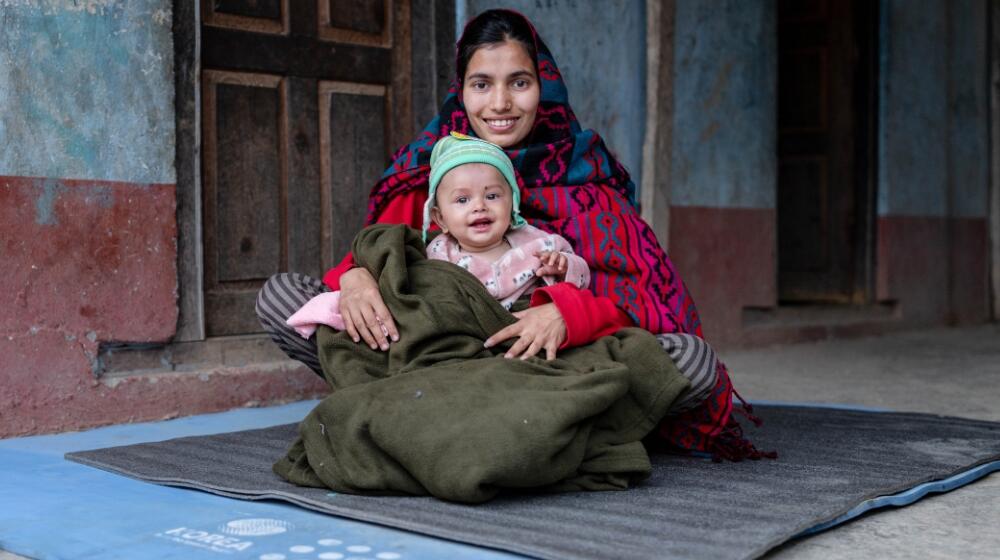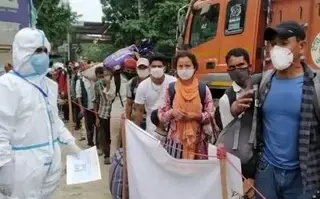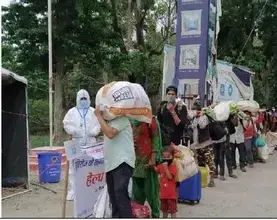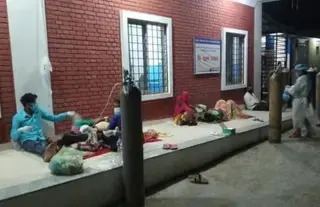A night that shook the community
On the evening of 3 November 2023, a powerful earthquake struck across three provinces in Nepal. “I was sleeping. I'd never experienced such a powerful earthquake before. I didn't know what to do, so I just ran outside. If I'd stayed inside, I probably would have been buried in the rubble,” recounts Meena, a young mother of 22 years of age from the village of Musikot. She was eight months pregnant at the time of the quake, and she and her husband had started building a family life and household in the village.
While she safely escaped her home, the damage caused to her house meant she could not safely return. The winter weather was closing in, with temperatures plummeting, exposing women and children to multiple compound risks.
Geeta and her family of two children are from the same village and were also impacted hard by the earthquake. “Before it hit, we had a small tea house serving tea, snacks, and meals that we invested in with the money that my husband sent home from abroad. We grew our own vegetables and reared chickens and goats,” recalls Geeta.
“After the earthquake, it was difficult as we had nothing. We slept under open skies, with only blankets and tarpaulin sheets to protect us. We didn’t have any of the simple things for basic hygiene because they were all lost and the markets were not accessible. Even if they were, we had no way of earning money, and we were unable to even tend to our animals and had to sell them as the business collapsed,” she continues.

Life in the immediate aftermath
Meena was fortunate that her husband returned for the delivery of the baby, and when he was home, he was able to support her, and he collected a set of winter items from a UNFPA distribution site for Meena and the newborn baby. “We were living in tents, so it helped us keep warm. The shawl helped me to cover the baby while breastfeeding and to carry the baby on my back. The mattress, blankets, and warm clothes were essential for us during the winter.”
Meena stares down lovingly at her baby daughter, who sleeps quietly wrapped and cocooned safely in a blanket just like any other newly born baby, while she recalls, “Before the earthquake, life was different. I would get up, clean the house, then go to our farm and the market to run errands. Everything was disrupted by the damage and destruction.” Meena explains.
Geeta recalls a similar situation and was able to collect some basic items from the community to cook and keep things running, and the family was temporarily sheltered in a tent in the immediate aftermath of the earthquake. She also received a UNFPA dignity kit that included a set of essential hygiene items specifically designed to ensure women are able to maintain proper hygiene, including during menstruation periods during emergencies. She explains, “This blue bag contained items that had been overlooked by everyone else. In times of these massive disasters, it is not possible to go around looking for sanitary and hygiene items.”
She continues “The underwear, sanitary napkins, and detergent soap was really useful for me. We received some relief materials, but this didn’t include underwear and pads. We were using patches of material from curtains because we didn’t have any available supplies. The reusable pads were much better because I was able to wash them.”

Resilience and rebuilding
These women are slowly rebuilding their lives. Meena has moved into rented accommodation while she and her husband save for the repairs to be carried out on their house. She stresses, “In these hills, life is difficult. There is a lot of walking and no public transport.” Just how hard it is can be testified by the scenes at the roadside across this area where women and young girls can be seen bent over, labouring home with enormous baskets of firewood on their backs.
Even though there is incredible hardship, she also feels hope and strength in her resilience. “My baby is my whole world. The future feels uncertain. It's hard with my husband gone, and it's scary to think of raising a child alone sometimes. But if I survived that earthquake night by myself, I can do anything.” She also wants her daughter to be a nurse when she grows up because “it is a respectable profession, and she would be responsible for taking care of so many lives.” The winter items that kept them warm over the months in the immediate aftermath of the earthquake are a small but vital step in the process of recovery.
Geeta’s family too is resilient in the face of the damage caused by the earthquake. “Everything is gone, but our hopes are intact. We built all of this by ourselves, and we can do it again.” For the immediate future, she wants to restart her restaurant, and, in the future, she is determined to have a shop too.
“We just need to wait for a little bit. After everything settles, we will do it again. Our business will start again, and we will once again serve good tea and rice.” Her daughter has returned to school, and a sense of normalcy has returned to village life. There is much work to do to get life back on track, but Geeta is confident of meeting that challenge. And the small but important packages she received during that crisis moment have helped her maintain her dignity as a woman with strong aspirations to succeed in business. Geeta concludes by saying “receiving these things made me feel respected for being a woman and a mother even amidst such a disaster.”
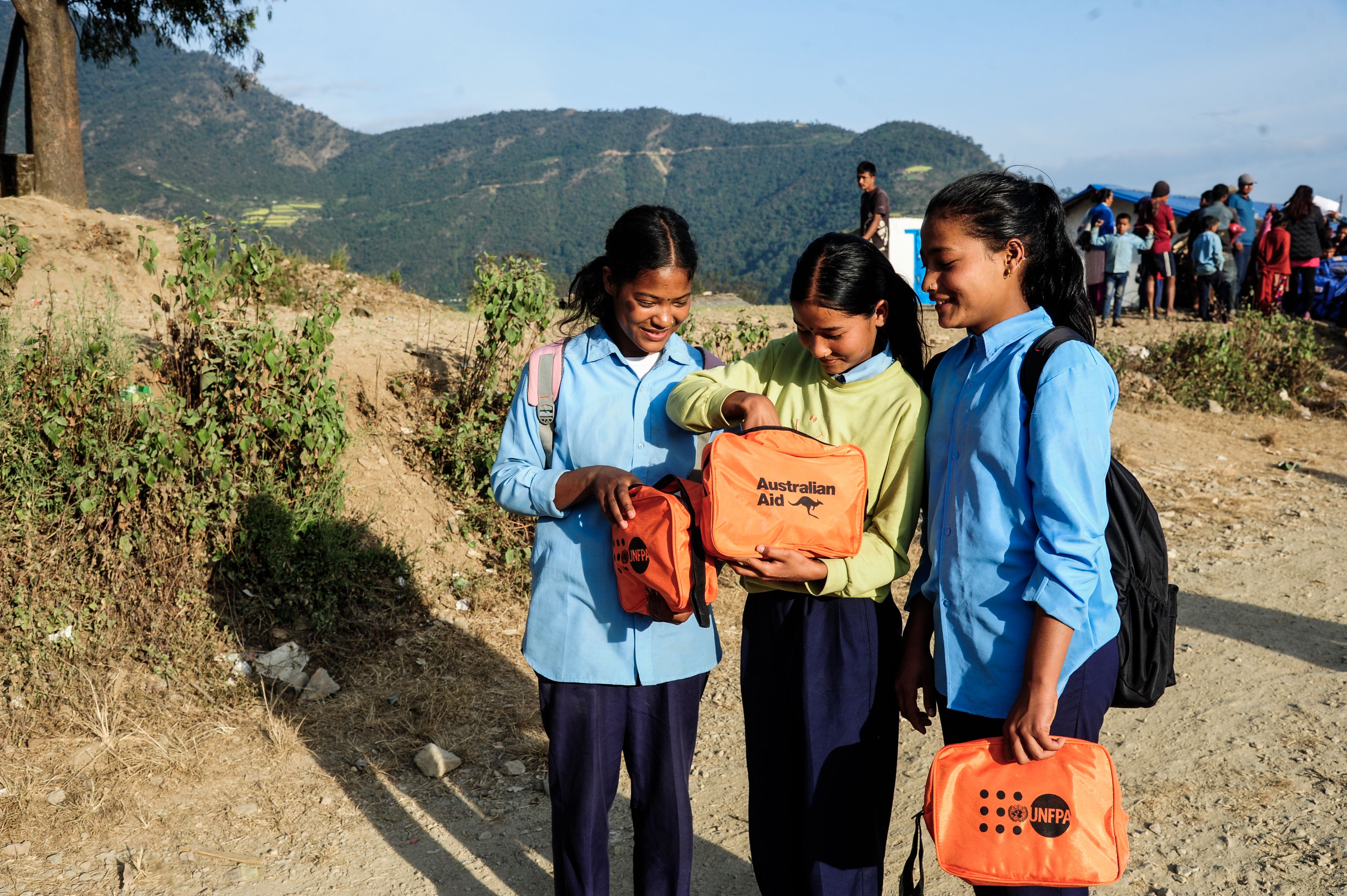
Women and children are disproportionally impacted by climate change and humanitarian disasters in Nepal. Earthquakes and seasonal flooding occur annually and with increased frequency. Communities in villages in the remote areas of the hills that rise up to the giant peaks of the mountains of the Himalaya are particularly vulnerable. These tiny hamlets are scattered across the sides of hills, and often going to markets entails long walks and visiting the nearest town days of travel.
Many of the households in these remote hamlets are single-handedly managed by women because the men have travelled from the province to find employment either across the border in India or further afield. This leaves women carrying an ever-larger share of the work burdens at home. When a crisis hits, it is the women who are immediately impacted, and it is the women who lead the recovery.
Funded by the Department of Foreign Affairs and Trade, Australia and Ministry of Foreign Affairs of the Republic of Korea, and UNFPA Emergency Fund Report, the UNFPA rapid response to the earthquake in 2023 has assisted 10,000s of women and their families in the immediate aftermath to survive the crucial winter months. As they now rebuild their lives, these women reflect not only on the setbacks in their plans for the future but also on the simple items in their lives, including warm blankets, hygiene and sanitary products that have ensured they were able to maintain their dignity to confront the challenges throughout that crucial early period.
In 2024, a joint UN recovery plan has started to assist these communities in rebuilding their lives further after the quake, which includes access to their sexual and reproductive health and rights to ensure these and other women are central to future decisions about their health and family life as they rebuild their livelihoods and future.

